The Windows Phone 7 Review
by Anand Lal Shimpi & Brian Klug on October 20, 2010 7:00 PM EST- Posted in
- Smartphones
- Windows Phone 7
- Microsoft
- Mobile
Bing Search and Maps
Bing is tightly integrated into WP7. One needs to look no further than the inclusion of a dedicated (mandatory) button for search just to tell how serious Microsoft is about pushing Bing into the mobile search space with WP7.
I talked earlier about how entering a string into the URL bar in Internet Explorer takes you out of the browser, into search, and then back depending on whether you choose a web result or not. In almost every context (save the marketplace, here search searches the market), pressing the physical search button launches this unified search application.
Bing search and maps honestly hasn’t changed much since I saw it at MIX10, and it really didn’t need to as far as basic maps and search go. Hit the button, and you get a Bing homepage like screen with the daily wallpaper and factoid boxes.
Search terms still pop up differing levels of semantic data - type a company and “stock quote,” and it’ll probably bring that down. Type “pizza in” and a city name, and you’ll get location results. It’s nice to see some intelligence here with searching. You can pivot between web, local, and news. Hit a link on web, and you wind up in the browser. Hit one in local, and you’ll probably wind up in maps. Whether or not you like Bing, the execution here is pretty above average.
What’s lacking is the ability to search local stores like the SMS library or email accounts. It’s sort of ambiguous anymore on every platform what search really does. WebOS has type anywhere, iOS has a mobile spotlight type approach, and Android does a pretty good job searching everything tied to your google account and web.
For whatever reason, WP7 only seems to want to search web facing content most of the time. Hop into messaging, hit search, and you get taken to Bing. Hop into mail, search, and you’ll search email you’ve downloaded - not what’s up on your exchange or IMAP server. Hop into people, hit search, and you’ll search your contacts, but can also search your exchange contacts. The result is that finding stuff is relegated to specific areas rather than one unified place. Whether or not this is right is more of a philosophical argument, it just happens to work that way here.
Another huge omission is the ability to search for things like shipper tracking numbers or unit conversions in Bing. The Bing website allows you to type in a FedEx tracking number or a unit conversion (e.g. 40 pounds in kg), but the search app on Windows Phone won’t give you those results. Given the data already exists on Microsoft’s end, it’s something I’d expect to see down the road.
Microsoft does still have to worry about the bottom line and thus you’ll sometimes see a sponsored search result (similar to what you’d get on a web browser) above your actual results. Microsoft says that the sponsored results will always be limited to one at most.
There’s also voice search support from within Bing and the entire platform. You can tap the microphone icon in Bing, or hold down the Windows button for a few seconds anywhere from WP7. It truthfully works very well for calling contacts, searching simple things, but sadly can’t nail down ‘Anandtech.com’ - that results in ‘Manhunt Xbox Com.’
Finally there’s Bing maps. I had a bad experience with Bing maps on Android. It felt slow and clunky, and initially lacked multitouch support entirely. Thankfully Bing maps on WP7 and home turf is completely diffrerent. It’s fluid, packs multitouch support, and loads quickly.
I think WP7 takes a strong nod from iOS here, going the minimalist route with basic directions, locate me, and search support. Expand the options menu, and you can toggle aerial views and traffic, or clear everything from settings.
Directions works well and is a bit unique. There’s support for walking and driving navigation directions, sadly no public transport. There’s a top window that shows the map as you progress and scroll through the directions in the list box below. Finally at the destination you get Bing’s street view perspective of the destination.
Searching from Bing maps for a location does what you’d expect - flags drop down onto the map. Tapping on these brings up details such as phone, website, and hours if Bing has them. Reviews and nearby and related listings also populate the adjacent pivots.
This is as opportune a time as any to note that the location services on WP7 have continually brought down very speedy location fixes. It’s fast and definitely leverages a location services database like Skyhook or respective databases Apple and Google use. I’m not entirely certain what WP7 is using, or whether Microsoft is rolling its own, but so far I’ve yet to be not be located just as well as I otherwise would be on Android or iOS even inside buildings with no possible way of getting GPS.


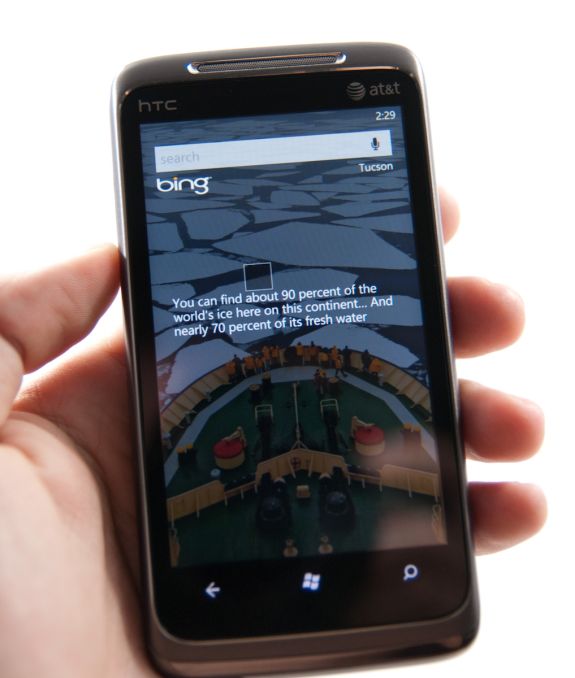
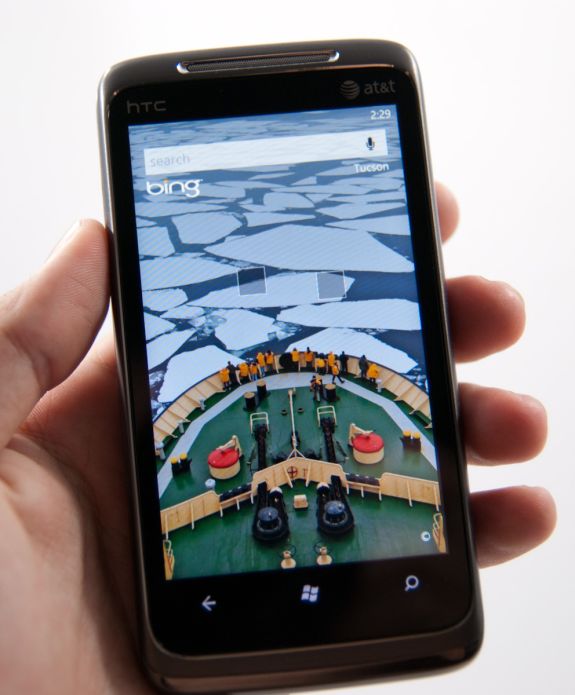
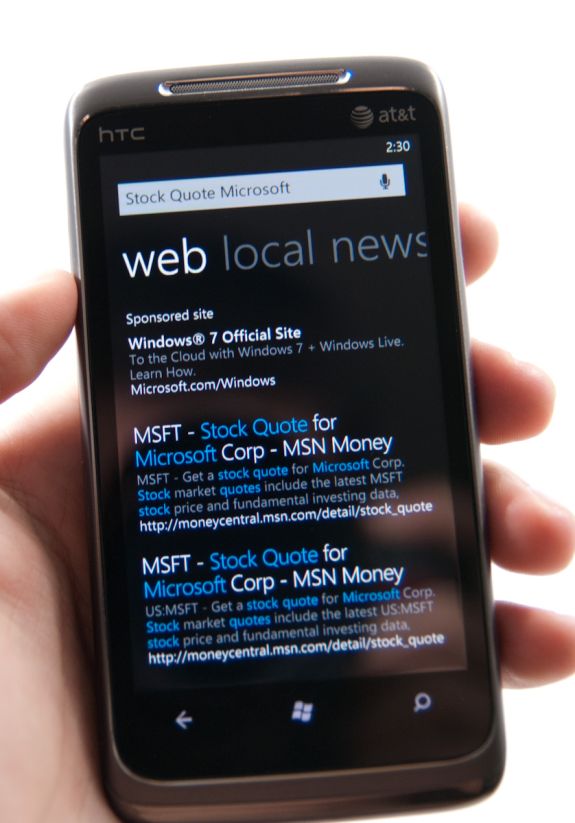
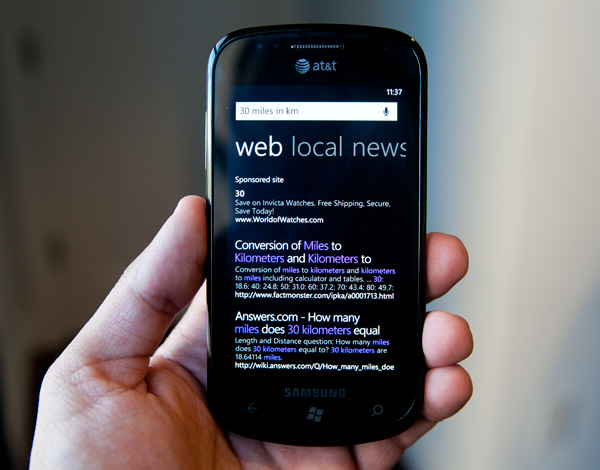
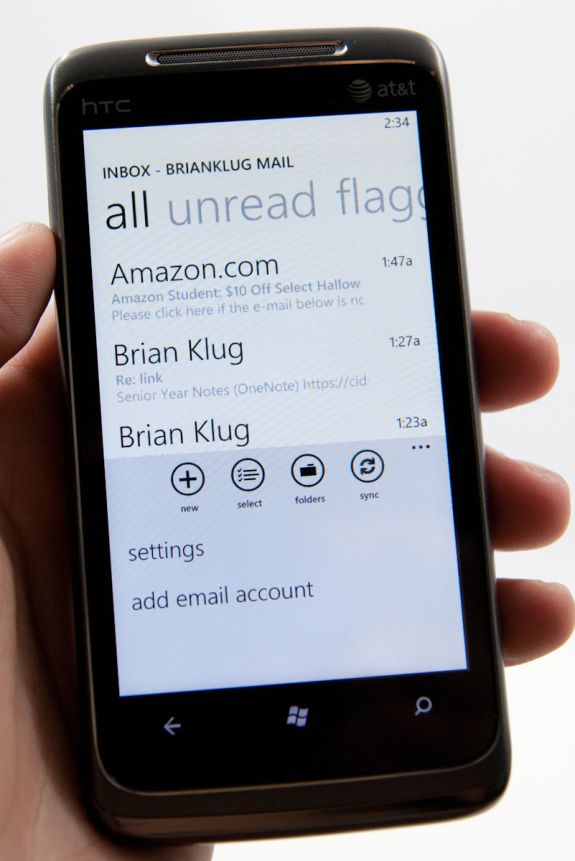
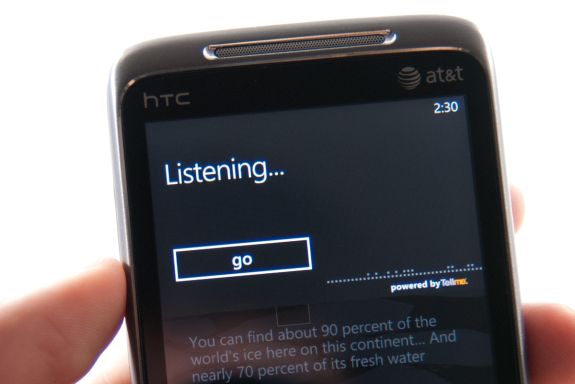
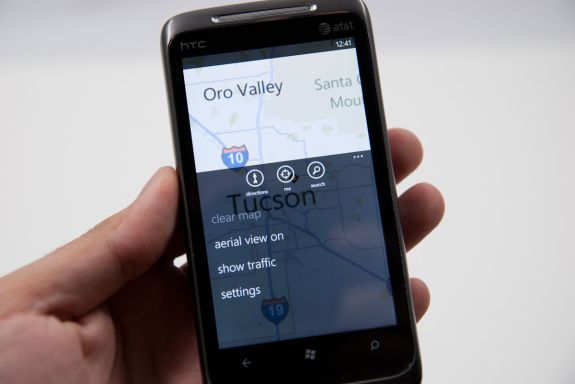
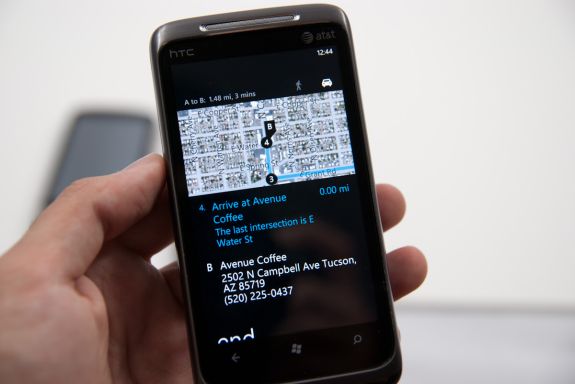
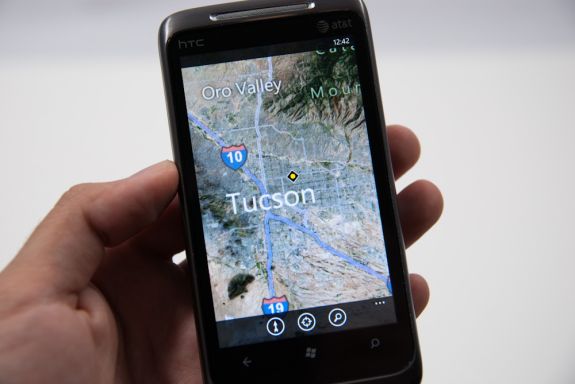








125 Comments
View All Comments
AssBall - Thursday, October 21, 2010 - link
LOL! Yeah, I think he needs to lay off the Ritalin.morphologia - Thursday, October 21, 2010 - link
Seems to me you are creating the problem yourself by caring about it so much. No one is forcing you to take such exception to political imagery. All you have to do is not care and the problem magically vanishes.Sheesh.
Fleeb - Saturday, October 23, 2010 - link
I did not even noticed that there is a Pepsi billboard in there up until you mentioned it. :SExelius - Wednesday, October 20, 2010 - link
Given the head start Apple and Google have, what are Microsoft's prospects with the carriers?Carrier support is obviously very important with licensed models like WP7 and Android... As Google learned with the Nexus One, what are Microsoft's prospects in mobile? Verizon is highly invested in Android, so don't look for them to push Android phones heavily, and AT&T is still riding Apple's cash cow... I don't think the two platform's positions are a coincidence.
Furthermore, is Microsoft prepared to potentially be the #3 mobile platform long-term? And that's assuming they can get out in front of RIM. I don't know that they have a chance of catching Google or Apple (Microsoft as a consumer brand is probably irreparably damaged and Google and Apple are still very popular.)
anactoraaron - Wednesday, October 20, 2010 - link
this is the #1 reason that I have right now for buying a WP7 phone. "Microsoft needs to pay the bills"??? Are you serious!?!? So their profits on Windows and Office are only for spending 1 billion on advertising and we get to eat it on seeing ads when I am searching through my email??? I can't understand the justification on not blasting MS here on this... which of their competitors do this now? This opens a door full of feces that I would rather not touch... Imagine turning on your phone to be bombarded by 3-10 ads before you can use the phone... and it starts with consumers being ok with an ad here and there while you do things not web related on your phone... "xbox live brought to your WP7 phone by Applebees- tap here to find the nearest applebees while your game loads"NO WAY MS... good try though. I guess it's up to Nokia/Intel with their meego to get my hard earned money... I am not paying for those ads on my phone - no way no how.
Smilin - Monday, October 25, 2010 - link
Which of their competitors do this now?Apple and Google that I'm aware of. Settle down beavis.
mcnabney - Wednesday, October 20, 2010 - link
Consumers know of three key smartphone products right now - Apple, Android, and RIM. The people that do know about Microsoft's previous offerings are probably still bitter.How will Microsoft overcome this deficit? They actually don't offer anything more than a nice slick interface that runs integrated functions smoothly, but falters on Apps. They won't even benefit from the latest must-have hardware - the launch phones are essentially 6 month old equipment.
RIM has always banked on the business customer, Apple with the trendy, and Android got everyone else. Well, they all have mature products now. Android was able to gain traction due to the iPhone/AT&T exclusivity which made them the only 'consumer targeted' smartphone on the other three American carriers. That was key to Android's success. There is no longer a pent-up demand for Microsoft to attach itself to.
What wasn't mentioned in the article is the competitive landscape for these devices. They will be going against superior Android hardware and a new version of the Pre. I just don't see much demand for these outside of the Zune-faithful.
lwatcdr - Thursday, October 21, 2010 - link
Yep it all comes down to on thing.Is Windows Phone 7 better in every way than IOS and Android. Frankly WebOS is also a very good mobile platform but is not getting anywhere near the buzz that it should.
Just being as good as just isn't enough when your competitors have a huge lead.
For me the big thing that WP7 offers will be ZunePass. If you are a music person that could be a huge benefit and it is a really good service I hear. I just don't think these devices are good enough and the lack of apps is a huge barrier.
AssBall - Thursday, October 21, 2010 - link
Remember the microsoft compatibility though. This OS has the potential to make for excellent corporate phones.teohhanhui - Monday, October 25, 2010 - link
Latest must-have hardware? That won't really matter to the average consumer. (And higher raw performance doesn't necessarily translate into better responsiveness, which greatly affects the user's perception of performance.)